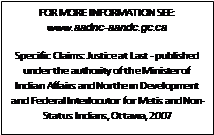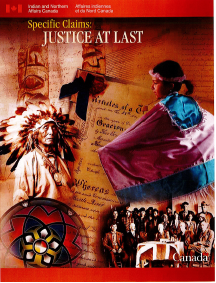
|
![]()
|
![]()  Land Claims Process Land Claims Process
![]() - Crown Canada - Crown Canada
|
![]()
|
|
![]()
|
![]()
|
![]()
|

|
![]()
|
|
Land Claims Process - Crown Canada
|
![]()
|
|
•
|
![]()
|
In March of 1997, a Joint Task Force on Claims Policy Reform was established to work towards an independent and authoritative body to manage claims, assist in claims negotiations and to determine any issues that cannot be directly resolved by the parties at the negotiating table.
|
![]()
|
|
•
|
![]()
|
First Nations are to present the legal basis of claims even though the Crown does not have to do the same.
|
![]()
|
|
•
|
![]()
|
A conflict of interest is created when the Department of Indian Affairs, who makes funding decisions, also decides the validity and settlement of any claim.
|
|
![]()
|
|
![]()
|
![]()
|
![]()
|

|
![]()
|
The Haldimand Treaty of 1784
Whereas His Majesty having been pleased to
direct that in consideration of the early attachment
to his cause manifested by the Mohawk Indians
and of the loss of their settlement which they
thereby sustained - that a ...  View More View More
|
![]()
|
|
![]()
|
![]()
|
![]()
|
|
|
|
![]()
|
![]()
|
![]()
|
|
Land Claims Process - Crown Canada
|
![]()
|
In, 1973, Indian and Northern Affairs Canada created the Office of Native Claims to review claims with First Nation Groups. In 1982, Canada created the Specific Claims Policy "Outstanding Business" to address specific illegal acts and injustices attributable by the Crown in Right of Canada and their Agents/Trustees.
Canada’s Specific Claims Policy was amended on April 25, 1991, which included: the formation of an Indian Specific Claims Commission and the acceptance of pre-Confederation claims. Only a small percentage of specific claims have been settled through negotiations or resolved by courts.
In 2007, a Specific Claims Action Plan was launched to alter the way Specific Claims are handled to improve and speed up the process. As a result of this action plan, a Specific Claims Tribunal Act came into effect in 2008. There are four scenarios in which a First Nation can file a claim with the Tribunal if they choose to:
- if a claim has not been accepted for negotiation by Canada;
- if Canada fails to meet the three-year time frame set out in the legislation for assessing claims;
- at any stage in the negotiation process if all parties agree;
- if three years of negotiations do not result in a final settlement.
There is a limit on the award of compensation of $150 million per individual claim, nor can it award punitive damages, compensation for cultural or spiritual losses or non-financial compensation.
Six Nations would also have to withdraw all claim submissions prior to 2008 and re-submit them with new evidence or allegations to be considered for the Tribunal.
For more information see:
www.aadnc-aandc.gc.ca
Specific claims Justice at Last published under the authority of the Minister of Indian Affairs and Northern Development and Federal Interlocutor for Metis and Non-Status Indians, Ottawa 2007

|

|
|
![]()
|
|
|

